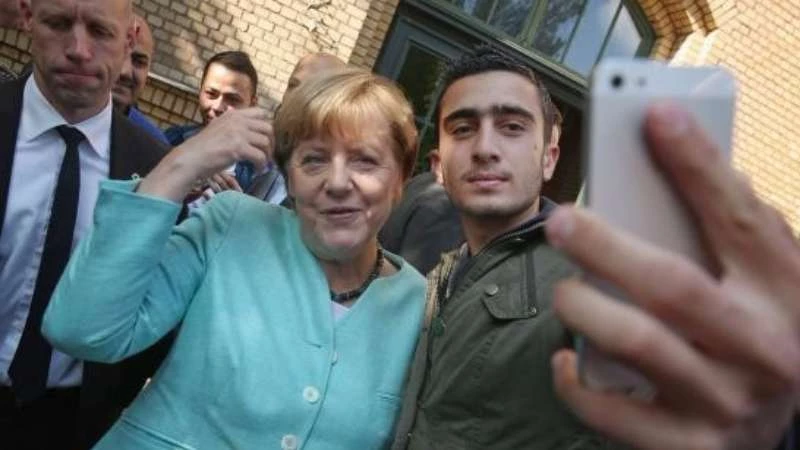And when 18-year-old Anas Modamani took his selfie with Angela Merkel shortly after his arrival in Germany, the uppermost thing on his mind was the gratitude he felt towards the compassionate leader who had opened her country’s borders to Syrian refugees looking for a safe place to begin their lives again.
The photo happened by chance when Merkel and a group of politicians and reporters paid a visit on September 10, 2015, to the accommodation in Berlin where Anas and other refugees where being housed as their applications for asylum were being processed.
At the time Anas had only been in Germany for a couple of weeks after making the arduous and oft-times dangerous journey from his besieged hometown of Daraya to Turkey where he took a perilous boat trip to Greece then up through Europe into Germany.
The spontaneous selfie was a beautiful photo of two happy smiling people that Anas would have treasured for himself if not for the fact that it was also captured by someone else.
“I took the selfie because my hobby is taking photos,” he told Lizzie Dearden for an article published by The Independent on January 18. “It was for me, not for other people.”
The teenager’s trouble began when an agency photographer standing nearby also captured the moment then published it on social media later that day.
The photo was swiftly picked up by far-right activists and refugee haters who manufactured their own version of events on social media that accused Anas of terrorism and attempted murder.
Unfortunately the “fake news” went viral within hours and even ended up being broadcast by international media outlets.
Instead of dying down and going away over time, the libelous stories have only evolved and grown bigger like a snowball rolling downhill forcing Anas to file a lawsuit against Facebook in an effort to clear his name.
Anas Modamani’s lawsuit claiming that he has been harmed by the social media giant’s alleged inability to remove the defamatory and distressing posts will be a landmark case says his lawyer, Chan-jo Jun.
Among the many fake stories that were also picked up by Twitter and “websites posing as ‘anti-mainstream media’ news outlets,” said Dearden, is one claiming that Anas was one of the ISIS militants who attacked the Belgian capital of Brussels, another that he was possibly the man who ran a truck through the Christmas market in Berlin last month and yet another that claims he was one of the seven suspects who set a homeless man on fire at a Berlin underground station over Christmas.
State-owned Russian media joined in the duplicity when it published an article claiming that Anas resembled Brussels bombmaker Najim Laachraoui, under the headline: “Did Merkel take a selfie with Brussels attack suspect?”
Even after the jihadi extremists were identified, Anas was still being viewed by many as a suspect.
The Christmas market massacre resulted in his photo surfacing on social media again superimposed over photos of the wreckage in a mock news story with the headline “They are Merkel’s dead”.
After a homeless man was set on fire in Berlin the selfie was resurrected once more on Facebook in a post that said; “Homeless man set on fire. Merkel took 2015 selfie with one of the perpetrators!”
Anas, who is now 19 years-old, says he only became aware of many of the posts through friends who expressed concerned for his safety and advised him to stay indoors to avoid being attacked.
When the fake stories continued to surface and refused to go away, an activist group that had debunked previous allegations put him in touch with a lawyer.
“I came to Germany because I wanted to live in peace, away from danger,” Anas told Dearden.
“I don’t want anyone to continue using my photo on Facebook. I want to live in peace without any problems.”
The beleaguered teenager, who is now employed and continues to study German, says he still cherishes his selfie with Chancellor Merkel in spite of the trouble it has caused him.
He posted it on Facebook himself along with photos that document the grueling journey that brought him to her country.
His lawyer says that Facebook has a legal responsibility to remove defamatory or discriminatory content that violates German hate crime laws.
“Instead, Facebook has created an environment that allows illegal content to thrive,” Jun told Dearden.
For its part, Facebook execs claim there is no basis for Jun to file an injunction against them since they initially took down one piece of content that “violates Mr Modamani’s right of personality” at his lawyer’s request.
But Dearden reported that a cursory search of the social network revealed that several other posts linking Anas’ photo with the Brussels attacks, as well as the attempted murder of the homeless man in Berlin, still remained
“In this case, I will either demonstrate the legal gaps that are still being closed to effectively enforce German law, or Facebook will learn that it does not pay to constantly violate the law.”
Jun said Facebook’s policies “must change”, claiming malicious posts had remained online because they were initially judged not to have contravened its rules.
Andre Wolf, a member of Austria’s Mimikama group which campaigns against “fake news” and abuse on social media, connected Anas with Jun and says that the young Syrian’s selfie had “brought many negative consequences” through no fault of his own.
“Anas Modamani is ultimately a victim of the hatred, prejudice and falsehoods of people on social networks – one of many,” Wolf told Dearden.
“False and defamatory posts cannot remain unpunished. The internet is not a rights-free zone.”
The case will be heard at the Würzburg District Court on February 6.



التعليقات (0)